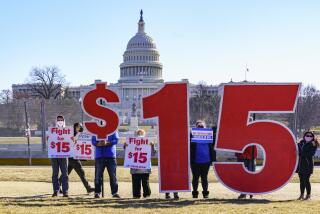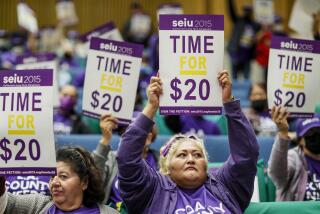New York Raises Its Minimum Wage; Hourly Rate to Hit $7.15
NEW YORK — New York state’s minimum wage was increased Monday for the first time in five years, from $5.15 to $7.15 an hour, as members of the Republican-controlled state Senate overrode a veto by Gov. George E. Pataki.
Under the bill, which had been approved by the Legislature in July, the state’s minimum wage will grow to $6 an hour on Jan. 1, increase to $6.75 on Jan. 1, 2006, and rise to $7.15 by Jan. 1, 2007.
New York joined 15 other states and the District of Columbia that have voted to raise their minimum wage since 1999. California’s minimum wage is $6.75 an hour.
“This is a great day for New Yorkers and for working people in other states, because this increase will build pressure for other legislatures to act in a similar way,” said Dan Cantor, executive director of the state’s Working Families Party. The small but increasingly influential state political party campaigned aggressively in the Legislature and the media for a rise in the Empire State’s minimum wage.
The Senate approved the override on a bipartisan 51-7 vote. A two-thirds vote is required to overturn a governor’s veto.
There had been some suspense because the Legislature was expected to hold only a brief session this week before adjourning for the year, and the wage bill would have died if lawmakers had not completed action on the override.
Critics of the increase, led by the Republican governor, said that it would be better for Congress to raise the $5.15 federal minimum wage in order to standardize rates among the 50 states.
Senate leader Joseph L. Bruno -- a Republican -- initially agreed, and he strongly opposed a state measure that had been backed by New York Democratic legislators.
Small-business leaders and agricultural groups also were opposed, warning that an increase in the minimum wage would mean higher prices for consumers and potential layoffs. The proposed increase “could damage small business and other employers,” said Mark Alesse, state director of the National Federation of Independent Business.
But Bruno changed his tune when members of the Democratic-controlled Assembly voted in August to override Pataki’s veto, and it appeared that there were more than enough votes in the Senate from both parties to do the same. Several Republican legislators were locked in tight reelection campaigns, and some GOP leaders feared that opposing an increase could put them in political jeopardy.
It also became clear that Congress was not likely to pass an increase this year on the federal minimum wage, which has not been raised since 1997. The federal wage level affects states that do not pass their own legislation.
“This increase will help the working families at the lowest income levels make ends meet, without putting an undue burden on small businesses and the economy, while it helps the working poor realize the value and dignity of hard work,” Bruno said.
More to Read
Get the L.A. Times Politics newsletter
Deeply reported insights into legislation, politics and policy from Sacramento, Washington and beyond. In your inbox three times per week.
You may occasionally receive promotional content from the Los Angeles Times.










